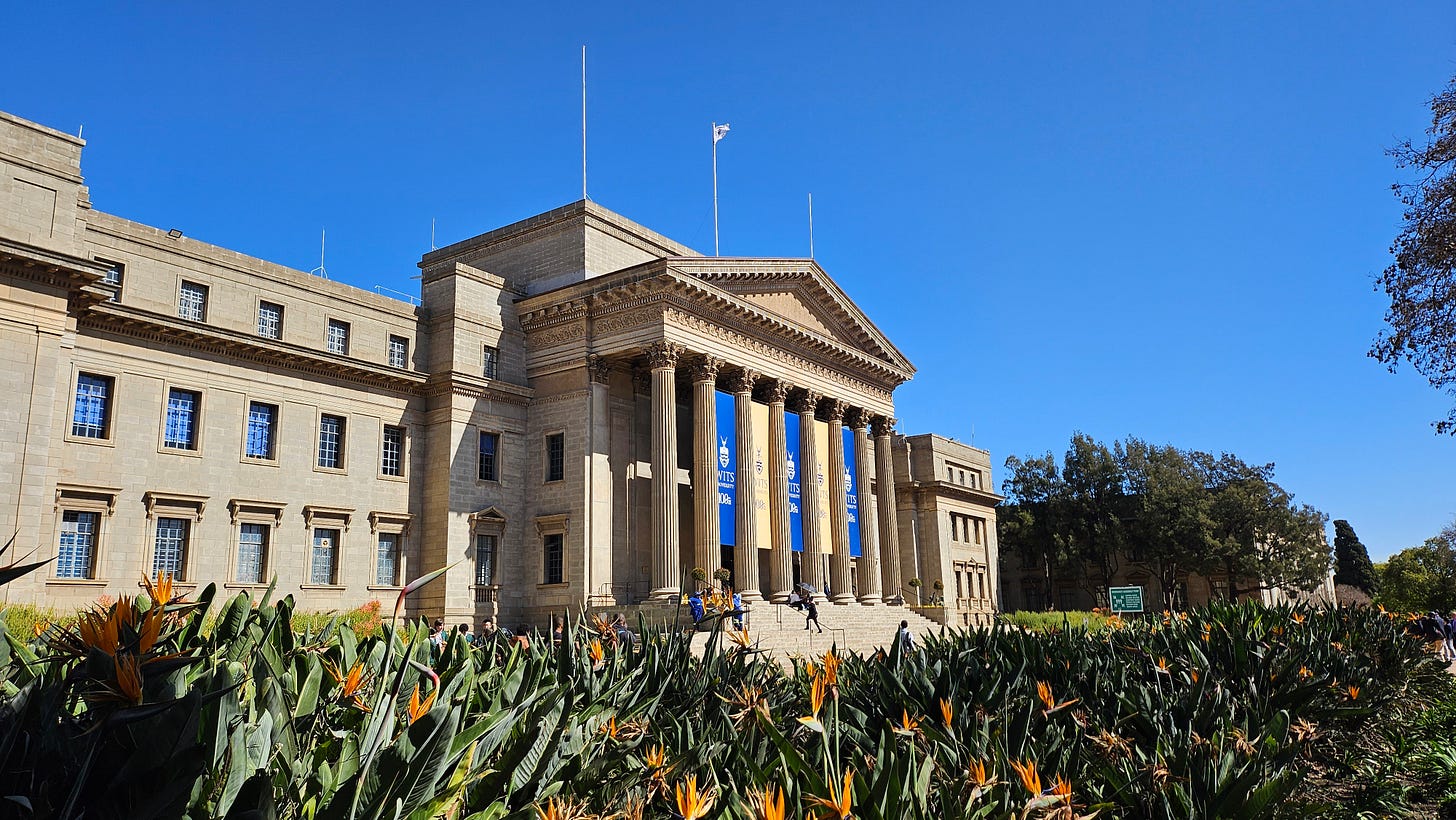Welcome to the August edition of Trust in Transition. This monthly newsletter, compiled by WISER scholars, is your gateway into finance, technology, and trust in Africa. Each month, the Substack features WiSER scholars unpacking the current events and stories shaping their research.
July Recap 🗓️
On the 3rd of July Laura Phillips, Keith Breckenridge, Khumisho Moguerane, and Tara Weinberg jointly delivered the fifth lecture in the series on the unified theory of trust.
The topic of this lecture was ‘tribal trust,’ a property form associated with the rule of African chiefs in the colonial era. Looking at the Glen Grey Act in colonial South Africa, colonial Bechuanaland in the late 19th century, African land buying syndicates in early 20th century Transvaal, and the unwinding of apartheid created property regimes in the early 1990s, the four presenters suggested that ‘tribal trust’ property was shaped as much by people on the ground as by the colonial state. Hlonipha Mokoena joined the conversation as discussant for the lecture, emphasising the intertwining of land and identity as a factor shaping how ‘tribal trust’ property regimes have been both entrenched and contested.
In late July three members of the Certizens Project visited the Trust group at Wiser to share their research. Amanda Hammar, Kojo Opoku Aidoo, and Godfrey Asiimwe are part of the Certizens team, working on regimes of classification, certification, and identification on the African continent. Their projects explore the politics and history of citizenship and the governance of identification in Uganda and Ghana and speak to many issues that have emerged from the Trust groups' research, such as the relationship between technology and state-issued IDs.
WiSER on the Move🌍
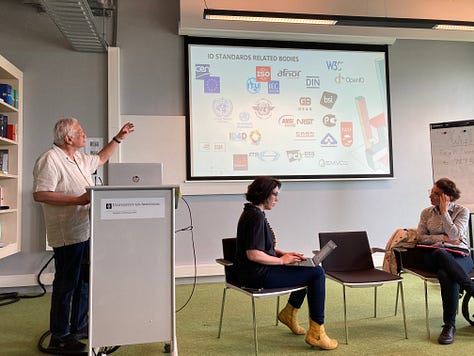
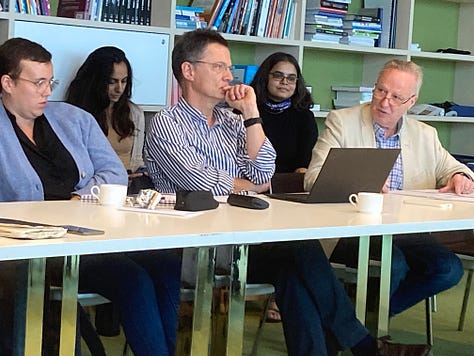

Working with Imke Harber’s CitizenGap at the University of Amsterdam several members of our project hosted and participated in the 5th biennial meeting of the Bhalisa Network. This meeting was dominated by the truly impressive work of many young researchers working on identification systems, and their political and institutional effects, around the world.
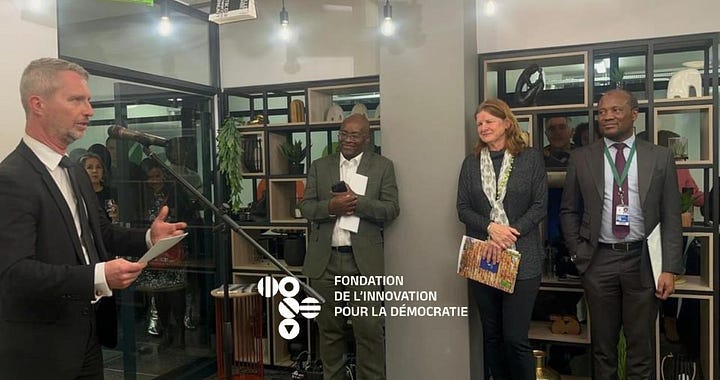
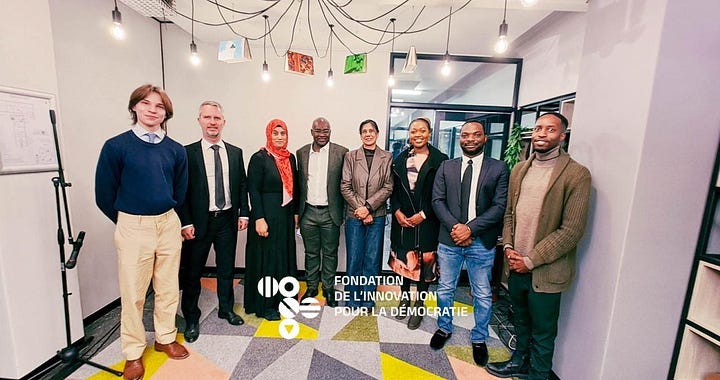
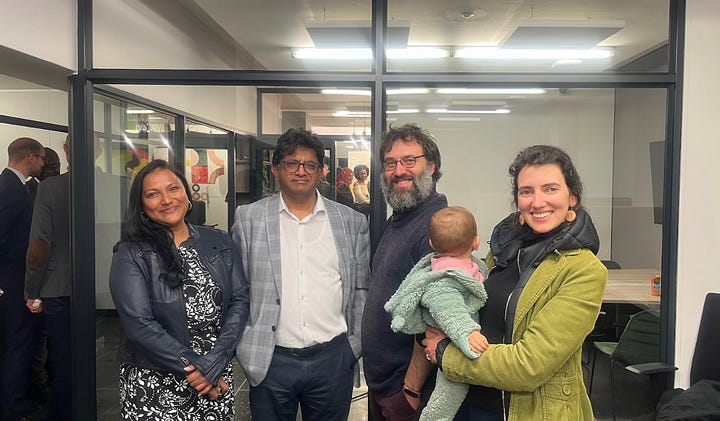
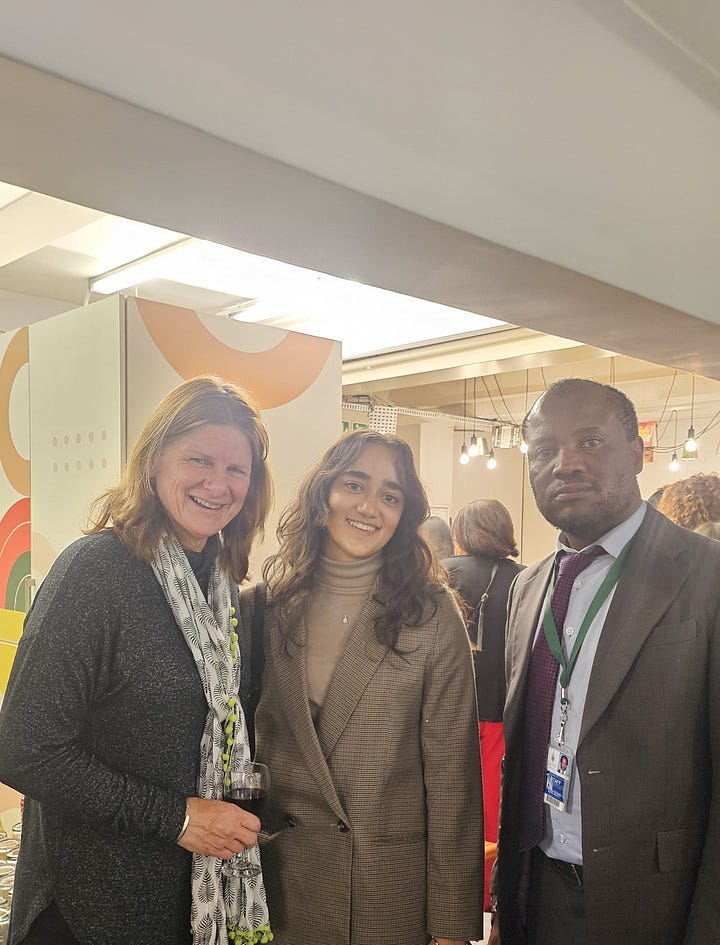
On July 30, 2024, Members of the Trust Project joined the Fondation de l’innovation pour la démocratie at the inauguration of its new offices on the premises of the University of the Witwatersrand in Johannesburg, South Africa.
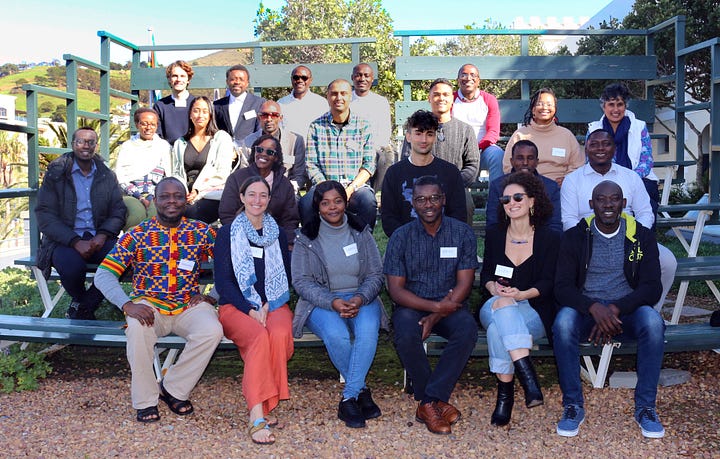
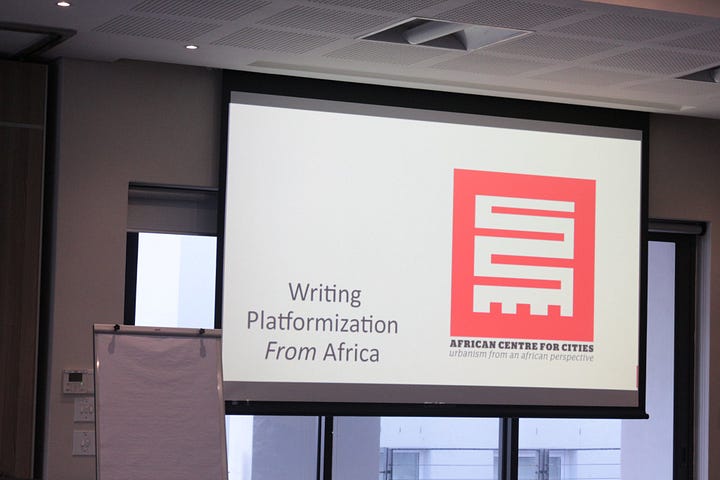
Postdoctoral Fellow Dr Raymond Onuoha was selected to participate in the Platformization in Africa Writing Workshop convened by the University of Edinburgh and the African Center for Cities (ACC) at the University of Cape from 15-17 July 2024.
⭐ The WiSER Feature:
“Should We Trust Digital Public Infrastructures?” Georges Macaire Eyenga | Postdoc Fellow | Trust
In this edition, Wiser Trust scholars and affiliates are reading the following:
“Mining's detachable rents, Tribal Trusts and violence.” Keith Breckenridge | Professor | Trust
“The Grind of Litigation: The Status of the South African ID-Blocking Case.” | Jonathan Klaaren | Professor | Law
“Silver at Sea.” Laura Phillips | Researcher | Trust
“Can we trust the data? The 2022 Census and Municipal Governance.” Joel Pearson | Postdoc Fellow | Trust
“Evaluating Ethiopia’s Economic Strategy: The Role of Diaspora Remittances.” Fatima Moolla | Doctoral Fellow | Trust
“Managing data breaches: MTN vs NIMC” Tunde Okunoye | Doctoral Fellow | Trust
“Mobile Data Cost Fluctuations in Ghana. Empty Promises or Long-Term Solution?” Caroline King | Doctoral Fellow | Trust
This edition explores scholarship highlighting topics like the management of data breaches, the implications of new economic policies on diaspora remittances, and the ongoing shifts in global politics, offering comprehensive insights into the dynamic interplay between policy, technology, and society.
The WiSER Feature 📝
Should We Trust Digital Public Infrastructures?
Georges Macaire Eyenga | Postdoc Research Fellow | Trust
Public digital infrastructures refer to essential technologies that facilitate the delivery of public services, access to information, communication with citizens, and interactions between markets and the government. Their deployment, operation, and maintenance are, at least officially, guided by the ideology of the common good rather than purely commercial logic. However, for these infrastructures to achieve their goals, it is crucial that they establish an initial trust relationship with their users. According to researchers Xin Li, Traci Hess, and Joseph Valacich (2008), understanding the formation of initial trust that motivates individuals to adopt a new information system or institutional technology is critical. Studying how this initial trust develops helps explain how users overcome perceptions of risk and uncertainty before using a new technology. This invitation aligns with the earlier reflections of Harrison McKnight (2005), who highlights that trust inevitably involves a dependency relationship between entities, whether it is a person and a technology. He identifies three key concepts to explain this dependency: trust beliefs, which lead a person to develop a secure conviction that the other party has sufficiently strong favorable attributes to generate trust intentions; trust intentions, which involve a person developing a strong willingness to engage in a dependency on the other party or to become specifically vulnerable to it, strong enough to generate trust behaviors; and finally, trust behaviors, which manifest as concrete actions demonstrating that one relies on the other party rather than on oneself or control mechanisms. Thus, he concludes that trust behavior is the tangible manifestation of the willingness to depend.
Challenging the idea that there is no trust relationship between humans and technology, Nancy Lankton, Harrison McKnight, and John Tripp (2015) assert that humans can and do trust technology. This trust is evident in the adoption of various technologies such as online recommendation agents, enterprise information systems, and m-commerce portals. These researchers examined how measuring trust in machines draws on concepts of interpersonal trust such as integrity, competence, and benevolence, often alongside system-specific concepts like reliability, functionality, and usefulness. They observe that a technology inspires more trust when it appears more human-like. They use social presence theory, social response theory, and affordance theory to describe aspects of technologies and user interactions that can make technologies human-like, thereby influencing perceived levels of closeness with humans. Following this logic, cybertrust—trust in the Internet and associated information technologies—has been deemed by William Dutton and Adrian Shepherd (2009) as essential for the successful development of public digital infrastructures (e-government, e-commerce, e-learning, and democratic participation in the online public sphere). These authors develop new perspectives on the factors influencing trust in the Internet. Cybertrust, defined as a confident expectation, depends on experience, measured by various proximity indicators to the Internet, and is influenced by education level, they conclude.
The development of digital public infrastructure is transforming how administrations and citizens interact, communicate, exchange, and resolve issues. This shift has significant implications for trust in the tools that facilitate this mediation. Indeed, mediation through a digital public infrastructure can sometimes lead to problematic experiences or, conversely, proceed satisfactorily. In 2020, at the onset of the COVID-19 pandemic, India launched the E-Rupi digital platform to distribute social assistance and support payments to citizens economically affected by the crisis. However, the platform faced numerous technical issues, such as frequent outages and long response times. Occasionally, access was impossible due to server overloads, preventing many users from submitting their aid requests on time. This situation resulted in difficulties for many vulnerable individuals who were unable to receive the necessary support to navigate the health crisis, thereby undermining trust in this digital public infrastructure. The failures led to emergency situations for some users, with challenges in paying essential bills, increased family tensions, and cases of psychological and financial distress.
In contrast, the experience is not always negative. In 2014, Estonia developed the e-Residency Portal, a digital platform for managing taxes and tax declarations, focusing on ease of use and system reliability. This platform allows foreigners to create and manage a business in Estonia entirely online, offering services such as tax management, tax declarations, and access to banking services. The e-Residency program has attracted thousands of entrepreneurs from around the world, contributing to Estonia's digital economy. This example illustrates how mediation through a digital platform can have a significant positive impact on citizens' experiences, their well-being, and their trust in public services.
With digitization, states are enthusiastically building digital infrastructures (digital trust infrastructure) that mediate administrative and financial transactions with users. In my research, I am particularly interested in the Harmony platform, established by the General Tax Directorate (DGI) of Cameroon to manage online tax declarations and other tax payments. Identification and authentication on this platform rely on the National Register of Taxpayers, which assigns a unique identification number (NIU) to each Cameroonian taxpayer. This NIU, displayed on a taxpayer card, is currently highly sought after in Cameroon for various reasons. It is required for opening a bank account, renewing a bank card, buying or selling land, clearing goods or vehicles at the port, obtaining travel insurance, paying taxes, registering public contracts, issuing vehicle registration certificates, registering various types of rental contracts, and subscribing to electricity and water services, among others.
In the official discourse of its promoters, the Harmony platform aims to restore trust between the public treasury and citizens, particularly in response to widespread corruption in taxation and revenue sectors, characterized by abuse, fraud, and extortion of users when these operations were largely conducted manually at counters. The Harmony platform has gradually been developed since 2014, incorporating various features related to tax declarations, public contracts, real estate transactions, and used vehicles. The digitization of taxes and the payment of property tax via mobile phone are in place. The digitization of tax functions has been effective since 2017, encompassing management, collection, control, and tax litigation. The "Harmony" platform centralizes various services and is accessible online via the Internet, both on computers and smartphones. Although the platform presents some common malfunctions observed in other online payment and declaration platforms in other countries, it is regarded by the General Tax Directorate as an essential trust infrastructure for economic development, political stability, and social cohesion.
Ethnographic surveys are currently underway to understand how each party perceives the Harmony platform. These surveys aim to explore several aspects: the bureaucratic vision of the state when deciding to create such a platform, the technical and financial contributions of project partners, whether technology providers or development partners, and the users' experience, who now must interact with a platform lacking the full attributes of pre-existing interpersonal relationships before digitization. The goal is to analyze the role of trust in the success or failure of this platform and assess to what extent it can be considered a trust infrastructure.
References
Xin Li, Traci J. Hess, Joseph S. Valacich, “Why do we trust new technology? A study of initial trust formation with organizational information systems”, The Journal of Strategic Information Systems, Vol 17, Issue 1, 2008, pp.39-71.
Harisson McKnight, “Trust in Information Technology.” In G. B. Davis (Ed.), The Blackwell Encyclopedia of Management. Vol. 7 Management Information Systems, Malden, MA: Blackwell, 2005, pp. 329-331.
Nancy K Lankton, Harrison McKnight and John Tripp, "Technology, Humanness, and Trust: Rethinking Trust in Technology," Journal of the Association for Information Systems, 2025, 16(10), . DOI: 10.17705/1jais.0041
William Dutton and Adrian Shepherd, “Trust in the Internet as an Experience Technology.” Information, Communication & Society, 2006, 9 (4): 433–51. doi:10.1080/13691180600858606.
✏️ Contributions:
“Mining's detachable rents, Tribal Trusts and violence.”
Submitted by Keith Breckenridge | Trust
Mafia state: Richards Bay Minerals pushes back, but the war is far from over
Amabhungane's impressive reporting details Rio Tinto's troubles in managing its relationships with the 1/4 equity partnership in Richards Bay Minerals, the largest tax payer in KwaZulu-Natal, through four tribally defined trusts, and an assortment of taxi bosses and gangsters. The trusts have paid out over R500 million over the last fifteen years, but the disbursements have not reached the intended beneficiaries, and RBM's efforts to reform their management have generated yet more violence, including the assassination of Meshack Mbuyazi and Nico Swart, previous General Manager of the company. As the report shows, the conflicts over these rents connect the people of the tribal lands around Richards Bay with the taxi and political bosses in Durban and in the national leadership of the ANC. Rio Tinto is surely right to argue for improvements in the governance of the trusts (which are apparently universally mismanaged under the current arrangements in the Masters' Offices) but it is going to be interesting to see how these efforts play out.
“The Grind of Litigation: The Status of the South African ID-Blocking Case.”
Submitted by Jonathan Klaaren | Professor | Law
Previous substack posts have detailed how a Pretoria court ordered the Department of Home Affairs to stop its practice of ID-blocking and how the DHA chose not to appeal that case yet began to send notification letters without reasons. Such “PAJA letters” consisted of a one page letter from DHA informing an individual that a marker had been placed against their ID document, that they were on notice regarding their ID being cancelled, and giving them 14 days to make representations to DHA. To the eyes of the applicants, the PAJA letter constitutes malicious compliance with the court order, in avoiding the court process foreseen in the structural interdict.
Things have now worsened from that unpromising start. In April 2024, DHA attested that it had unblocked the IDs of relevant minor children as required by another part of the court’s order. However, at an hour-long case management meeting held with the lawyers in front of the presiding judge in July 2024, the applicants and the amicus curiae indicated their view that the DHA had failed to comply in any part with the court order – including no use of the structural interdict’s process of going to court for unblocking -- and that they would bring an application for the Department’s contempt of court. For their part, the DHA admitted partial compliance with the court order (failing as yet to have uplifted the blocks for those persons not found to pose a security risk) and indicated its intention to apply for an extension of the period for compliance. These two applications will be heard together at a High Court hearing on 13 September 2024. The wheels of litigation grind slowly.
“Silver at Sea.”
Submitted by Laura Phillips | Researcher | Trust
At the height of World War Two, in 1942, the SS Tilawa set sail from India carrying, amongst other things, 2364 bars of silver. The ship was bound for Durban, where the silver would be offloaded and transported for minting at the newly established South African Mint. En route however, it was struck by Japanese torpedoes, killing almost three hundred passengers and sinking the ships' cargo. Over seventy years later the company Argentum Exploration - set up precisely to locate and retrieve shipwrecks and their cargo - found and made claim to the sunken silver. But, after several years of court cases, in May the UK Supreme Court ruled in favour of the South African government.
“Can we trust the data? The 2022 Census and Municipal Governance.”
Submitted by Joel Pearson | Postdoc Fellow | Trust
City of Joburg in fight to save budget after Stats SA shrinks its population
In most of South Africa’s municipalities, tools of data collection and capacities for the continuous monitoring of local demographic trends are notoriously poor. Rural municipalities, in particular, often govern in the dark, making decisions without accurate, up-to-date information about the populations that live on their doorsteps. Since the inception of wall-to-wall local government in the early 2000s, however, these municipalities have at least been able to rely on the data provided by the national census - a massive undertaking performed every ten years by StatsSA, whose enumerators sweep across the country, visiting households to answer detailed questionnaires. By the end of last year, rural municipalities continued to draw primarily on Census 2011 data in furnishing their Integrated Development Plans (IDPs) with statistical substantiation. Yet significant doubts have been cast over the reliability of the most recent census which took place in 2022, amidst the dying embers of the Covid-19 pandemic. Researchers from the University of Cape Town have described Census 2022 as “incoherent and implausible”, and the numbers, they continue, “are probably not fit for purpose to assist with fiscal allocation, or for national, provincial, or particularly local government planning and resource allocation”. According to Census 2022, the population of the City of Johannesburg has virtually stagnated over the last ten years, for instance, while the City of Cape Town is now allegedly almost equal in size – highly suspect assertions that contradict the experience of city officials on the ground.
“Evaluating Ethiopia’s Economic Strategy: The Role of Diaspora Remittances.”
Submitted by Fatima Moolla | Doctoral Fellow | Trust
As Ethiopia embraces financial liberalization, highlighted by Dahabshiil’s collaboration with Safaricom's M-Pesa, it raises questions about the sustainability of relying on diaspora remittances for economic development. This initiative facilitates smoother transactions for the Ethiopian diaspora and aligns with broader reforms, including foreign exchange liberalization and launching a new stock exchange.
While these remittances are seen as catalysts for entrepreneurship, their potential to address Ethiopia's broader economic challenges remains debatable. Can this strategy foster sustainable economic independence, or does it risk creating dependency that could stifle local innovation? India’s experience as a global leader in remittances, drawing $120 billion in 2023 alone, illustrates the dual nature of such financial inflows. They support millions of households yet spark discussions about long-term economic resilience versus dependency. Ethiopia’s economic restructuring efforts, leveraging remittances as a development lever, merit close examination. This approach could either underpin a robust economic future or act as a temporary measure that delays necessary systemic reforms.
“Managing data breaches: MTN vs NIMC”
Submitted by Tunde Okunoye | Doctoral Fellow | Trust
Two students arraigned for hacking MTN computers
As more of our global technology and data infrastructure are connected via the Internet, vulnerabilities such as data breaches and cybersecurity exploits have increased. This has been true for even the most technologically astute organisations globally - as shown by the recent Crowdstrike cybersecurity incident. Acknowledging these realities, and communicating them with transparency is key to building Trust.
In Nigeria we have had two examples of how to manage disclosures of data breaches. Whereas the National Identity Management Commission (NIMC) has been dogged by incidents of data breaches and responded by largely issuing denials and obfuscations, MTN’s recent acknowledgement, investigation and arraignment of hackers in a Nigerian court has been refreshing. Rather than diminishing MTN’s reputation, it can be argued that the proactive and transparent way the firm handled this incident has enhanced its standing within Nigeria’s corporate space.
“Mobile Data Cost Fluctuations in Ghana. Empty Promises or Long-Term Solution?”
Submitted by Caroline King | Doc Fellow | Trust
Data prices likely to reduce by end of 2024 – NCA
In 2022, MTN announced an increase in its data prices in Ghana, leading to public uproar and postponing of the action. But the end of 2023 brought the increase of 15%, this amidst the country’s ongoing inflation and general dissatisfaction, leading to renewed protests and calls for boycotts. But because of spotty coverage through other mobile network operators (MNOs) a boycott was hard to implement, as MTN is the dominant network provider in Ghana. MTN justified the increase by stating that they had not had significant price hikes in previous years and much of the upkeep cost has been carried by the company itself.
In reaction to online debates that criticized the National Communication Authority’s (NCA) classification of MTN as a Significant Market Power (SMP), the NCA issued a statement claiming that this classification had no influence on the price hikes, further declaring that prices will decrease in the last quarter of the year. This decrease is made possible through the introduction of a NGIC wholesale carrier-neutral open access network, meaning that the MNOs are no longer responsible for maintaining the infrastructure, but rather “another entity” will take on this role. The statement does not elaborate who this “other entity” is, leading to questions of legitimacy around the process. As time goes on, this story will develop and hopefully hold true, making online access easier for Ghanaians.
Trust in Transition is a Substack, by the Trust Project, exploring the intricate interplay between trust, finance, and societal evolution within the African context. This space serves as a lens into the fascinating dynamics of trust infrastructures, financial landscapes, and their transformative impact on Africa's economic pathways.
About WiSER:
As a part of The Witwatersrand Institute for Social and Economic Research (WiSER), our mission is to spotlight African scholarship, dissecting the nuances of societal transitions, financial evolution, and trust frameworks. Established in 2001, WiSER has been at the forefront of interdisciplinary research, delving deep into the humanities and social sciences in South Africa.



